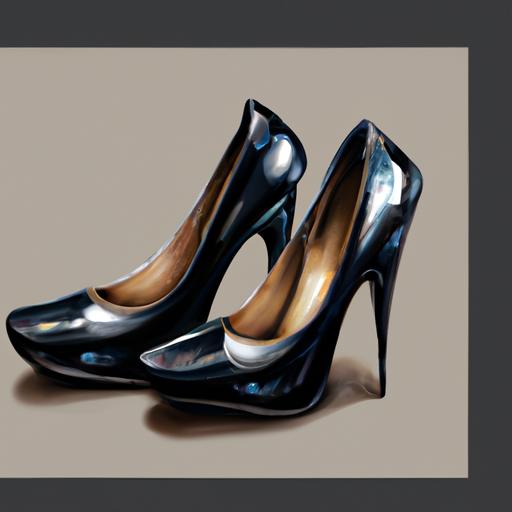Are your high heels making your calves bigger? It’s a common misconception that high heels are the cause of larger calf muscles, but the truth is much more complicated.
In this article, we’ll be exploring the factors that truly affect calf muscle size, how high heels affect your calves, the benefits and potential downsides of wearing high heels, and tips for choosing and wearing high heels safely.
With this knowledge in hand, you’ll be able to make the best decision for your body and health.
Ready to learn more? Let’s get started!
Short Answer
No, wearing high heels does not make your calves bigger.
While it may give the illusion of larger calves due to the height of the heels, it is not actually making the muscles in your calves any bigger.
High heels can, however, cause calf pain and soreness due to the strain put on the muscles.
It is generally recommended to wear flat or low-heeled shoes to avoid discomfort.
The Misconception of High Heels Making Calves Bigger
Wearing high heels has been a popular part of fashion and style for centuries, but there is a common misconception that wearing them can cause your calves to become bigger.
This misconception might have originated from the idea that heels can make your legs look longer and slimmer, which in turn can make your calves look more pronounced.
However, the truth is that the size of your calves is determined by genetics and exercise, so wearing high heels will not cause your calves to become larger.
Although high heels will not make your calves bigger, they can make them look more toned and defined.
This is because wearing high heels places extra strain on the calf muscles, which can help to tone and strengthen them.
In addition, the higher angle of the heel can cause the calf muscles to contract, which can make them look more defined.
So, while wearing high heels won’t make your calves bigger, it can make them look more toned and defined.
Ultimately, it is important to remember that high heels can’t make your calves bigger, but they can make them look more toned and defined.
If you are looking for a way to make your calves look more toned and defined, then wearing high heels might be a good option.
However, if you’re looking for a way to make your calves bigger, then you should focus on genetics and exercise.
Factors That Affect Calf Muscle Size

When it comes to calf size and muscle tone, genetics and exercise are the two biggest determinants.
Genetics plays a big role in determining your natural calf size, while regular exercise can help you build muscle size, tone, and definition.
Other factors, like age, gender, and body type, can also play a role.
For example, men tend to have larger calf muscles than women, and those who are older tend to have less muscle definition.
However, wearing high heels can also have an effect on the size and tone of your calf muscles.
High heels place extra strain on the calf muscles, which can help to make them look more toned and defined.
This is why high heels are often seen as a tool for toning the calves.
But its important to remember that high heels cannot make your calves biggerthey can only make them look more toned and defined.
How High Heels Affect Calf Muscles
When it comes to fashion and style, high heels have long been a staple in many wardrobes. While high heels may be stylish and fashionable, there is a common misconception surrounding them: that wearing them can make your calves bigger. But is this actually true?
The truth is that wearing high heels does not necessarily cause your calves to become larger.
Muscle size is determined by your genetics and exercise habits, not by the shoes you wear.
However, wearing high heels can make your calves appear more toned and defined.
This is because high heels place extra strain on the calf muscles, which can help to tone them and make them appear more defined.
So, while wearing high heels may not make your calves bigger, it can make them look more toned and defined.
Ultimately, it is important to remember that high heels cannot make your calves bigger, but they can make them look more toned and defined.
In addition, it is important to note that there are other factors that can affect the appearance of your calves, regardless of whether you are wearing high heels or not.
Your diet, exercise habits, and even your posture can all have an effect on the look of your calves.
So, if you are looking to make your calves look more toned and defined, wearing high heels can help, but it is important to remember that there are other factors that you should consider as well.
With the right diet, exercise, and posture, you can make your calves look their best.
Benefits of Wearing High Heels

While it is true that wearing high heels will not make your calves bigger, they can still offer plenty of benefits.
Wearing high heels can help to make your calves appear more toned and defined, as they place extra strain on the calf muscles while you walk.
This can help to create a more sculpted and defined look, which can be attractive and stylish.
Additionally, wearing high heels can also help to improve your posture and make your legs look longer and slimmer.
This can be especially beneficial for those with shorter legs, as the extra height provided by the heels can help to create a more balanced and flattering look.
Furthermore, wearing high heels can also help to make you look more confident and stylish, as it can give you an added boost of height and poise.
All in all, while wearing high heels will not make your calves bigger, they can still offer plenty of positive benefits.
Potential Downsides of Wearing High Heels
While wearing high heels may give the appearance of toned and defined calves, there are potential downsides to consider when deciding if high heels are the right choice.
For one, wearing high heels for prolonged periods of time can be very uncomfortable, leading to foot pain, soreness, and even long-term damage.
Additionally, high heels can cause the calf muscles to become strained and tight, leading to cramping and fatigue.
Wearing high heels can also lead to an elevated risk of injury, as the increased height of high heels can cause the wearer to lose their balance and stumble.
Furthermore, high heels can cause the Achilles tendon to become overly tight, which can lead to pain in the back of the leg and ankle.
All of these factors should be taken into account when deciding whether or not to wear high heels.
How to Choose the Right High Heels for You

When it comes to choosing the right high heels for you, there are several factors to consider.
First, you should consider the heel height and type.
High heels with a stiletto heel can be very slim and delicate, while a thicker block heel can provide more stability.
Depending on your body type and comfort level, you can choose a heel height that works best for you.
Additionally, you should consider the material of the shoe.
Leather, suede, and patent leather are all popular materials for high heels, and each has its own advantages and disadvantages.
Leather is durable and can be more comfortable for wider feet, while suede has a softer feel and is often more stylish.
Lastly, you should also consider the shape of the shoe.
Pointed toe high heels can be very flattering and elongate the legs, while round toes can be a more comfortable option.
No matter what style you choose, make sure you opt for a shoe that fits well and is comfortable to wear.
Tips for Wearing High Heels Safely
When it comes to wearing high heels, safety should always be your primary concern.
High heels can be an attractive addition to your wardrobe, but they can also put a lot of strain on your calves, ankles, and feet.
Therefore, it is important to take the necessary steps to ensure you are wearing them safely and comfortably.
First and foremost, make sure you choose the right size.
Your high heels should fit snugly and not be too tight or too loose.
You should also take the time to break them in before wearing them for extended periods.
This can be done by wearing them around the house for short periods of time and gradually increasing the amount of time you have them on.
It is also important to wear the correct type of high heel for the occasion.
If you are wearing them for a special event or night out, opt for a lower heel.
Higher heels will put more strain on your calves, so it is best to avoid them if you can.
Additionally, try to avoid wearing high heels for long periods of time.
If you are going to be walking or standing for extended periods, opt for a lower heel or even flats.
Finally, make sure to take regular breaks.
If you are wearing high heels for a long period of time, make sure to take a break every few hours to give your feet and calves a rest.
This will help to reduce the amount of strain on your muscles and will make it easier to wear them for extended periods of time.
Following these tips can help make sure you are wearing high heels safely and comfortably.
Remember, wearing high heels does not necessarily cause your calves to become larger, but they can make them appear more toned and defined.
Ultimately, it is important to remember that high heels can be a great addition to your wardrobe, but they should always be worn safely and with caution.
Final Thoughts
It is clear that high heels do not necessarily make your calves bigger, but they can give the appearance of toned and defined muscles.
If you choose to wear high heels, it is important to consider the benefits and downsides, as well as how to choose the right heels and wear them safely.
Ultimately, the decision to wear high heels is up to you, but you now have all the information you need to make an informed decision.
So go ahead and slip on your favorite pair of high heels – you may just find that you love the look and feel of them!

